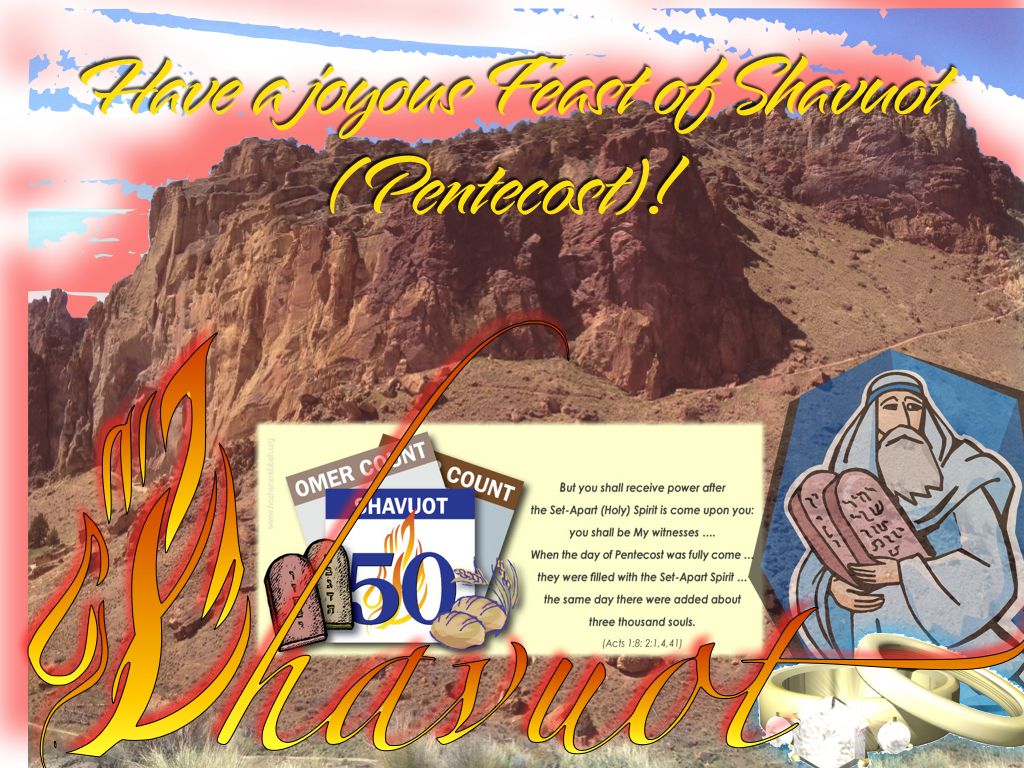
Shavuot is the third festival in YHVH’s cyclical parade of annual sacred appointed times. It is also known as the Feast of the Harvest of the First Fruits (Exod 23:16), Day of First Fruits (Num 28:26) and the Feast of Weeks or Shavuot (which is Hebrew for weeks, Exod 34:22; Deut 16:10, 16; 2 Chr 8:13). Shavuot falls fifty days “from the day after the [weekly] Sabbath” (NKJV) that falls during the Days of Unleavened Bread, and hence the derivation of the name Pentecost (meaning “to count fifty”) as recorded in the Testimony of Yeshua (or New Testament/NT, Acts 2:16).
According to the first-century Jewish historian, Flavius Josephus, the concept of counting fifty was expressed by the Jews of that day by the Hebrew word Asartha (Ant. III, x, 6). The 19th century Jewish scholar S. R. Hirsch in his Torah commentary refers to it as Azereth (The Pentateuch-Leviticus, p. 663). Both of these references seem to pointto the Hebrew word VRMG atzerah or atzereth,pl. meaning “an assembly or solemn assembly.”
YHVH through his Torah (the law of Moses) instructed his people that Shavuot was…
- a day of rest where laborious or servile work was prohibited (Lev 23:21)
- a commanded assembly (Lev 23:21)
- a time when the priests offered up offerings and sacrifices (Lev 23:18–20)
- a time when all males were to bring the tithes of the increase of their income (Exod 23:14; Deut 16:16)
- a time when the priests were to offer up as a wave offering to YHVH two loaves of leavened bread made of the freshly harvested wheat (Lev 23:17–20)
- to occur where YHVH would place his name and all were to go there to celebrate it (Deut 16:11)
- a time of rejoicing (Deut 16:11)
- to be forever (Lev 23:21)
An Agricultural Festival With Prophetic Implications
Ancient Israel was an agricultural society that had a spring harvest of grain and a fall harvest of fruit. The spring harvest consisted of the smaller barley harvest, which began during the Days of Unleavened Bread, and the much larger wheat harvest occurring fifty days later at Shavuot. Both the barley and wheat harvests were prophetic pictures symbolizing new life and new creation, and both were presented to YHVH by the priests for his acceptance—a sheaf of barley on First Fruits Day on the Sunday during Hag HaMatzot (the Feast of Unleavened Bread, Lev 23:10–11), and two loaves of leavened wheat bread on Shavuot (Lev 23:17).
On First Fruits Day, the priests of Israel would raise the newly harvested barley and wave it before YHVH for his acceptance. This was a prophetic picture of Yeshua who upon his resurrection Saturday evening, and subsequent ascension to heaven later on the first day of the week to be accepted by the Father (John 20:17) at the exact time the priests were waving first fruits sheaf of barley heavenward. Literally, Yeshua was the first to resurrect from the dead, and can thus be called the first of the first fruits of the resurrection from the dead.
Fifty days later Pentecost occurred when the priests offered to YHVH the two loaves of leavened bread made of wheat from the first fruits of the larger of the two spring harvests. This foreshadowed the larger harvest of souls during the time period from the giving of the Ruach HaKodesh (the Set-Apart Spirit) until Yeshua’s second coming. We are at the close of that time period now as the end of the age draws near. The Feast of Pentecost in Acts chapter two ushered in this time period with the harvest of thousands of people (Acts 2:41,47). It must be inserted here that an even larger harvest of people for the kingdom of YHVH is yet to occur during the fall feast days, which corresponds with the largest harvest of the entire year—the fall fruit harvest. This spiritual harvest will occur just prior to and after the return of Yeshua as an innumerable multitude of people come to faith in Yeshua out of the great tribulation (Rev 7:14) and when many more will be saved during the Messianic Age (or Millennium) itself.
The Prophetic Implications of the Feast of the Harvest of First Fruits
As we have seen, The Feast of the Harvest of First Fruits is another name for Shavuot (Exod 23:16; 34:22; Num 28:26). At Passover time, the barley (Exod 9:31 cp. chap. 12) was ready to be harvested in the land of Israel. Fifty days later at Pentecost, the larger wheat crop was ready for harvest (Exod 34:22). Barley and wheat were the two main grain crops of Israel (Deut 8:7–8; 2 Chron 2:15; Jer 41:8). In the late summer, the larger harvest of fruits and vegetables occurred.
These three harvests coincided, as noted above, with Israel’s three pilgrimage festivals: Passover, Pentecost and the Feast of Tabernacles. The success of these three harvests was contingent upon the arrival of the fall (early or former) rains and the latter rains of the spring upon the land of Israel. In biblical and Jewish thought, these rains are prophetic of an outpouring of the Spirit of Elohim upon the earth, as well as of an outpouring of YHVH’s Torah-understanding and glory. This two-fold aspect of YHVH’s Word (spirit and truth) is expressed in many ways in many places throughout the pages of Scripture:
Continue reading




